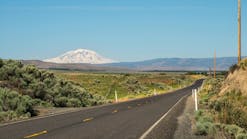• Victory for environmentalists will lead to clean up of stormwater pollution statewide, improved water quality
BOSTON, MA, May 30, 2008 -- In a precedent-setting decision, a federal court judge has ruled from the bench that the Massachusetts Highway Department violated federal clean water laws by failing to develop an adequate stormwater cleanup plan for its 2,500 miles of urban roads and bridges. The decision, by Judge William G. Young, stems from a lawsuit filed by environmentalists charging MassHighway was not properly implementing a provision of the federal Clean Water Act requiring them to control and clean up polluted water that flows off roadways into neighboring lakes and streams.
Rivers, streams and lakes throughout Massachusetts are suffering serious water quality problems due to untreated stormwater from MassHighway's roads and bridges. The court's ruling is a landmark victory for every resident concerned about the impact this major source of water pollution has on their rivers, lakes and streams," said Chris Kilian , Director of the Clean Water and Healthy Forests Program at the Conservation Law Foundation (CLF), a New England environmental group whose legal victories paved the way for the clean up of Boston Harbor and protection of Georges Bank, a critical ocean fishing ground..
MassHighway has long ignored their legal responsibility to protect the Commonweath's water resources for the health of all residents. The Court has asked them to live up to that responsibility," said CLF Staff Attorney Cynthia Liebman who helped argue the case in Court.
After a six day trial, Judge Young ordered MassHighway to commit to a two-year schedule for adopting a new, revised stormwater pollution cleanup plan. The Judge also said the agency must quickly move to address pollution hot spots in Lancaster and the Charles River watershed.
Polluted stormwater is a significant factor in the ongoing failure of Massachusetts ' s rivers and lakes to achieve basic water quality standards. Rain water that falls during storms flows off roads picking up pollutants along the way - including oil and grease, toxic metals (such as zinc, nickel, and lead), salt and other de-icing chemicals. Unless steps are taken to control and treat the polluted stormwater, it flows directly from roads into rivers, streams and lakes, affecting the health of the entire ecosystem.
###


